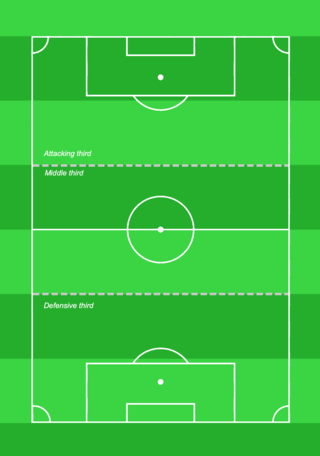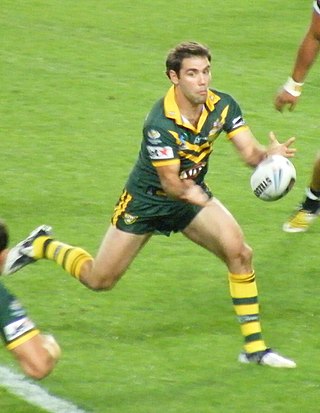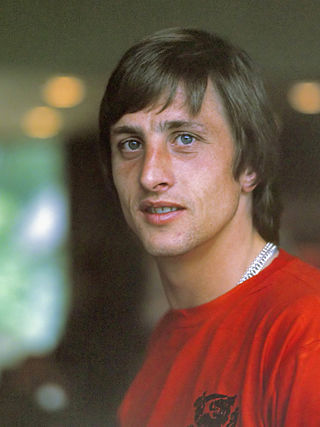In association football, rugby league, rugby union and Australian rules football, a dummy or feint is a player deceiving the opposition into believing he is going to pass, shoot, move in a certain direction, or receive the ball and instead doing something different, thus gaining an advantage.
In association football, a dummy (feint) is often used when dribbling, in offensive situations. Examples used in order to deceive an opponent into what direction you will move, include: the step over as used by Ronaldo and Cristiano Ronaldo; the flip flap (also known as "elastico") used by Rivellino, Ronaldo and Ronaldinho; the Marseille turn (also known as the "360" or "roulette") used by Zinedine Zidane, and Diego Maradona; the rainbow flick as used by Neymar; the Cruyff turn named after Johan Cruyff; and scoop turn (dragging the ball around a defender without it leaving your foot) as used by Romário. [1] [2] [3] [4] [5]
The next most common instance is also an offensive situation, in which a player, in a reasonable shooting area, fakes a shot to trick a defender coming in for a tackle and have him flinch away. This allows the player to go around the defender and shoot from a closer distance. This dummy can also be used on a goalkeeper in a one-on-one situation: a notable example being the "Goal of the Century" scored by Diego Maradona where, having run half the length of the field past several outfield players, he faced goalkeeper Peter Shilton and left him on his backside with a feint, before slotting the ball into the net. [6]
There is another situation that is used often enough that "dummy" becomes a verb. In this scenario, a player goes toward the path of passing ball, pretends to trap it and lets it goes through the legs. This is to allow his teammate—who is also moving toward the ball but further away—to retrieve it. Another common scenario is the "dummying" player running after the ball after letting it go through their legs, a move which is known as the nutmeg. This is very effective if the trap fake is convincing because the stop/start on the defending player is always slower than the attacking player, who has the momentum. Luis Suárez is known to execute these types of moves quite often. [7]
In rugby league football and rugby union football, a dummy has a similar meaning, but is generally confined to a player leading their opposing players into believing that they are about to pass or sometimes kick the ball, but instead retaining and running with the ball. This has the effect of drawing defending players to the apparent recipient of the dummy pass. If successful, the defender is said to have been "sold the dummy". [8] One of the first rugby players to be credited with using the dummy, or at least taking the technique to New Zealand, was Tommy Haslam. Haslam played for Batley before the rugby schism and was a member of the 1888 British Isles tour of New Zealand and Australia. [9]
In Australian rules football the term 'dummy' again has a similar meaning to other football codes. A dummy is used to evade a tackler by feigning a hand pass or foot pass to a teammate and then changing direction suddenly to escape the opponent who has been fooled by the move. The term is also described as baulking or 'selling candy'.

In the sport of association football, a forward is an outfield position which primarily plays further up the pitch than midfielders and defenders. As with any attacking player, the role of the forward relies heavily on being able to create space for attack. Their advanced position and limited defensive responsibilities mean forwards normally score more goals on behalf of their team than other players.

A penalty kick is a method of restarting play in association football, in which a player is allowed to take a single shot at the goal while it is defended only by the opposing team's goalkeeper. It is awarded when an offence punishable by a direct free kick is committed by a player in their own penalty area. The shot is taken from the penalty spot, which is 11 metres from the goal line and centered between the touch lines.

In the sport of association football, a midfielder is an outfield position which plays primarily in the middle of the pitch. Midfielders may play an exclusively defensive role, breaking up attacks, and are in that case known as defensive midfielders. As central midfielders often go across boundaries, with mobility and passing ability, they are often referred to as deep-lying midfielders, play-makers, box-to-box midfielders, or holding midfielders. There are also attacking midfielders with limited defensive assignments.

Team tactics as well as individual skills are integral for playing association football. In theory, association football is a very simple game, as illustrated by Kevin Keegan's namely assertion that his tactics for winning a match were to "score more goals than the opposition". Tactical prowess within the sport is nonetheless a craftsmanship of its own, and one of the reasons why managers are paid well on the elite level. Well-organised and ready teams are often seen beating teams with more skillful players on paper. Manuals and books generally cover not only individual skills but tactics as well.
Basketball moves are generally individual actions used by players in basketball to pass by defenders to gain access to the basket or to get a pass to a teammate to score.

Like most forms of modern football, rugby league football is played outdoors on a rectangular grass field with goals at each end that are attacked and defended by two opposing teams. The rules of rugby league have changed significantly over the decades since rugby football split into the league and union codes. This article details the modern form of the game and how it is generally played today, although rules do vary slightly between specific competitions.
In sports, dribbling is maneuvering a ball by one player while moving in a given direction, avoiding defenders' attempts to intercept the ball. A successful dribble will bring the ball past defenders legally and create opportunities to score.

A nutmeg, also known by dozens of national and regional variations, is a skill used mainly in association football, but also in field hockey, ice hockey, and basketball. The aim is to kick, roll, dribble, throw, or push the ball between an opponent's legs (feet). This might be done to pass or when shooting the ball, but a nutmeg is more commonly associated with the skill of dribbling where it enables a player to get behind a defender.

Curl or bend in association football is a definition for a spin on the ball which makes the ball move in a curved direction. When kicking the ball, the inside of the foot is often used to curl the ball, but this can also be done by using the outside of the foot. Similar to curl, the ball can also swerve in the air, without the spin on the ball which makes the ball curl.

A penalty shot or penalty kick is a play used in several sports whereby a goal is attempted during untimed play. Depending on the sport, when a player commits certain types of penalties, the opposition is awarded a penalty shot or kick attempt. The rules on how a player attempts a penalty shot or kick also varies between sports.
The step over is a dribbling move, or feint, in association football, used to fool a defensive player into thinking the offensive player, in possession of the ball, is going to move in a direction they do not intend to move in.

The Cruyff turn is an evasive dribbling move used in football, and named after Dutch player Johan Cruyff.

Rugby union is a contact sport that consists of two teams of fifteen players. The objective is to obtain more points than the opposition through scoring tries or kicking goals over eighty minutes of playing time. The play is started with one team drop-kicking the ball from the halfway line towards the opposition. The rugby ball can be moved up the field by either carrying it or kicking it. However, when passing the ball it can only be thrown laterally or backward. The opposition can stop players moving up the field by tackling them. Only players carrying the ball can be tackled and once a tackle is completed the opposition can compete for the ball. Play continues until a try is scored, the ball crosses the side line or dead-ball line, or an infringement occurs. After a team scores points, the non-scoring team restarts the game at the halfway with a drop kick toward the opposition. The team with the most points at the end wins the game.
The Marseille turn, also known as the 360, the Spin, the Mooresy Roulette, the Roulette, the Girosflin, and the double drag-back, is a specialised dribbling skill unique to the game of Association football. With so many different names, the exact origin of this skill move is unknown. The Marseille turn was first popularized in Europe by French striker Yves Mariot in the 1970s. Diego Maradona and Zinedine Zidane were arguably the most notable exponents of the move, and thus it has also been known as the Maradona turn and the Zidane turn.
Rugby league football has accrued considerable jargon to describe aspects of the game. Many terms originate in the Laws of the Game. Some aspects of the game have more than one term referring to them. Different terms have become popularly used to describe an aspect of the game in different places, with notable differences between the Northern and Southern Hemispheres.
The runaround move is a football move designed to get around an opponent, made famous by Pelé in the 1970 World Cup. The move involves letting a dribble or a pass from a teammate approach but allowing it run past the opponent, then sprinting around the opposing player to continue the attack.

Hendrik Johannes Cruijff, commonly known as Johan Cruyff, was a Dutch professional football player and manager. Regarded as one of the greatest players in history and as the greatest Dutch footballer ever, he won the Ballon d'Or three times, in 1971, 1973, and 1974. Cruyff was a proponent of the football philosophy known as Total Football developed by Rinus Michels, which Cruyff also employed as a manager. Because of the far-reaching impact of his playing style and his coaching ideas, he is widely regarded as one of the most influential figures in modern football, and he is also regarded as one of the greatest managers of all time.
Write the Future is an advert made by Nike football for the 2010 World Cup and directed by Mexican filmmaker Alejandro González Iñárritu for the UK based production company, Independent Films Limited. The full version is over three minutes in length and features football players Didier Drogba, Fabio Cannavaro, Wayne Rooney, Franck Ribéry, Ronaldinho, and Cristiano Ronaldo as its main players. All of the players play in a scenario during a World Cup match and after significant events occur, the players usually see a significant ripple effect outside the world of football. The advert aired during the 2010 FIFA World Cup. It features the song "Hocus Pocus", by progressive rock band Focus. It was created by Wieden+Kennedy and produced by Elissa Singstock and Olivier Klonhammer, written by Mark Bernath, Eric Quennoy, Stuart Harkness and Freddie Powell. The Sound design and mix was done by Raja Sehgal working out of Grand Central Recording Studios in London. The advertisement won the Film Grand Prix at the 2011 Cannes Lions festival.

Association football was first codified in 1863 in England, although games that involved the kicking of a ball were evident considerably earlier. A large number of football-related terms have since emerged to describe various aspects of the sport and its culture.

The flip flap is a dribbling move, or feint, in football used to trick a defensive player into thinking the offensive player, in possession of the ball, is going to move in a direction they do not intend to. Players perform it by using the outside of their dominant foot to push the ball towards their dominant side, then quickly move the dominant foot around the ball and using the inside to push the ball to their non-dominant side. Although the footwork is the most distinctive aspect of the flip-flap, its success as a feint also relies heavily on the attacking player having an explosive acceleration from a stationary position.